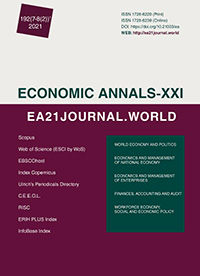Educational dominant of the information economy development: a case of Latvia for Ukraine
Educational dominant of the information economy development: a case of Latvia for Ukraine
Author(s): Antonina Djakona, Nataliia Kholiavko, Maksym Dubyna, Artur Zhavoronok, Maiia FedyshynSubject(s): Economy, Business Economy / Management, Higher Education , ICT Information and Communications Technologies
Published by: Institute of Society Transformation
Keywords: Information Economy; Digitalization; Higher Education; University; Science; National Economy; Innovations; GDP; Latvia; Ukraine;
Summary/Abstract: Introduction. In recent years, digitalization is one of the defining trends of the development in the leading countries of the world. The development of information economy is influenced by a combination of factors; however, the most powerful is an educational dominant. The higher education institutions (HEIs) carry out training activities for information economy, the development of digital skills of the personnel, as well as carrying out studies of the personnel’s digital skills, and conducting research, generating innovations and their transfer to the real sector of economy. The purpose of the paper is to analyze the impact of higher education on the dynamics of information economy on the example of Latvia with further identification of the best practices and their adaptation to the Ukrainian social and economic conditions. The research methodology is conditioned by the implementation of the in-depth comparative analysis of the development of higher education systems in Latvia and Ukraine; within the study, were used the method of constructing cubic regression models of the relationship between indicators.The hypothesis:1) there is an objective interaction between the level of economic development of the country and the amount of public funding for higher education;2) the information economy development is largely determined by the level of higher education development, and funding for research at HEIs.Results. The study revealed the following constraints on the development of the national higher education system: complex geopolitical, demographic, migration situation, which affects the parameters of the student body of HEIs; low competitiveness level of HEIs in the global educational services market; low level of financial autonomy of HEIs; lack of financing, low level of diversification of the financing sources for HEIs, etc. These problems negatively affect the pace of the information economy development in Ukraine. The authors proved that the Latvian experience in the implementation of the digitalization strategy could be useful for Ukraine, because of some similar economic, social, mental, historic conditions and factors of development of both countries. The calculations on the econometric models of relationship between funding and basic indicators of higher education development in Ukraine and Latvia showed: the amount of funding for higher education systems does not depend on the number of HEIs; the number of students depends on the amount of public funding (this indicates the important role of the state in the higher education development, in increasing the level of accessibility of higher education for citizens); close relationship between the amount of funding for higher education and the number of graduate students; positive trend in funding for higher education.Conclusions. The authors conclude that strengthening the impact of the educational dominant on the information economy development requires: ensuring a proactive position of HEIs (by modernizing their educational, research and innovation activities); activating the role of the government sector in protection of intellectual property, stimulating the development of innovatively active enterprises and their cooperation with universities, involving investments in the development of the HEIs’ innovative infrastructure, commercialization of innovative results of the research in the real sector of the economy.
Journal: Економічний часопис - ХХІ
- Issue Year: 192/2021
- Issue No: 07+08 (2)
- Page Range: 108-124
- Page Count: 17
- Language: English

